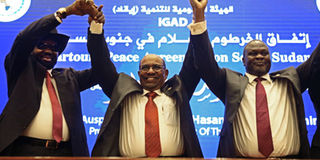South Sudan opposition accuses government of breaking ceasefire

Sudanese President Omar al-Bashir (C) raises held hands with South Sudan's President Salva Kiir Mayardit (L) and South Sudanese rebel leader Riek Machar (R) after the two South Sudanese arch-foes agreed in Khartoum on June 27, 2018, to a "permanent" ceasefire to take effect within 72 hours in their country. AFP PHOTO
What you need to know:
- Army spokesman Lul Ruai Koang, said he was "unaware" of any such clashes in the area
South Sudan rebels, led by former vice president Riek Machar, on Saturday accused the army of breaking a ceasefire just hours after it came into force.
Rebel spokesman Lam Paul Gabriel said government forces had "launched an attack Saturday morning on a rebel position at Mboro, near the northwest town of Wau.
"The regime’s forces in coordination with (rebel Sudanese) JEM militias launched a heavy joint attack," Gabriel said.
The attackers employed 14 land cruisers, four armoured personnel carriers and three trucks, "just hours after the ceasefire takes effect,” he added.
South Sudan's President Salva Kiir and his arch-foe Machar agreed, at talks in the Sudanese capital Khartoum on Wednesday, to a "permanent" ceasefire to take effect within 72 hours, raising hopes of an end to four-and-a-half years of war.
The conflict erupted in 2013, around two years after South Sudan won independence from Sudan, when Kiir accused his then-deputy Machar of plotting a coup.
It claimed tens of thousands of lives, displaced four million people and left the newly created country's oil-rich economy in tatters.
Kiir and Machar then signed the document, called the "Khartoum Declaration", in the presence of Sudanese President Omar al-Bashir.
Asked by AFP on Saturday whether government forces had breached the new ceasefire, army spokesman Lul Ruai Koang, said he was "unaware" of any such clashes in the area.
"It is not true that we are on the offensive," he added.
The United Nations had given the two South Sudanese sides until the end of June to find a viable political agreement or face sanctions.




